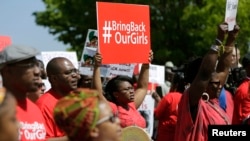The deputy chairman of the African Union (AU) has called for robust international cooperation and intelligence-sharing to help defeat increasing terrorism on the continent, following the abduction of Nigerian school girls by militant group Boko Haram, last month.
The AU has sharply condemned the abduction of the school girls and expressed concern about their plight after the continental body demanded their immediate and unconditional release.
Erastus Mwencha says the increase in cross border crimes including terrorism, human and drug trafficking are challenges to peace and security on the continent.
Mwencha says the Boko Haram militants appear to be well organized and internationally connected, which he says enables them carryout their violent activities against unarmed civilians.
“If you noticed, the Boko Haram leader was speaking standing in front of a [military] tank,” said Mwencha. “Now, where does he get that kind of money to buy the [tank]? It is because of the connections globally, and so it is important peace and security is not only taken, at individual level, at community level, at national level, but at regional and international level,” he said.
Mwencha called for more action to combat the rise in militant groups on the continent. He says there is need for a stronger collaboration in intelligence gathering and sharing to help stem the tide of growing terrorist activities.
“Whenever we get to know the systems or networks that they use either in sending funds, we should take action,” said Mwencha. “We should also work together because most these [militants] work cross borders for us to be able to fight it and be determined to root it out. That will also require not only sharing intelligence, but also supporting each other logistically, and all other avenues,” he said.
Mwencha says the AU continues to work closely with President Goodluck Jonathan’s effort to find and free the abducted schools girls.
He says there has been an increase in cooperation among AU member states in the fight against cross border crimes.
“There is a growing and a robust system of cooperation among the member states at a regional level and, and this is also taking root at continental level,” said Mwencha. “This requires very sophisticated networks that [would] be able to counter the activities of the terrorists, and that is where the international community comes in.”
But, some critics say African countries have been weak in combating increasing terrorism, and in seeking out international assistance to fight the threat.
Mwencha disagrees.
“The first thing we should note here is that this is a new phenomenon. And the second aspect is that when you are looking at asymmetric war, there is no face to it. So you are dealing with a network that knows each other but you don’t know them, and so you cannot say there is unwillingness on the part of the international community. But, it’s in the nature of the war itself,” said Mwencha.”
He says there is unanimous international agreement that the sharp rise in terrorist activities in Africa requires a global concerted effort, to defeat the militant groups.
The AU has sharply condemned the abduction of the school girls and expressed concern about their plight after the continental body demanded their immediate and unconditional release.
Erastus Mwencha says the increase in cross border crimes including terrorism, human and drug trafficking are challenges to peace and security on the continent.
Mwencha says the Boko Haram militants appear to be well organized and internationally connected, which he says enables them carryout their violent activities against unarmed civilians.
“If you noticed, the Boko Haram leader was speaking standing in front of a [military] tank,” said Mwencha. “Now, where does he get that kind of money to buy the [tank]? It is because of the connections globally, and so it is important peace and security is not only taken, at individual level, at community level, at national level, but at regional and international level,” he said.
Mwencha called for more action to combat the rise in militant groups on the continent. He says there is need for a stronger collaboration in intelligence gathering and sharing to help stem the tide of growing terrorist activities.
“Whenever we get to know the systems or networks that they use either in sending funds, we should take action,” said Mwencha. “We should also work together because most these [militants] work cross borders for us to be able to fight it and be determined to root it out. That will also require not only sharing intelligence, but also supporting each other logistically, and all other avenues,” he said.
Mwencha says the AU continues to work closely with President Goodluck Jonathan’s effort to find and free the abducted schools girls.
He says there has been an increase in cooperation among AU member states in the fight against cross border crimes.
“There is a growing and a robust system of cooperation among the member states at a regional level and, and this is also taking root at continental level,” said Mwencha. “This requires very sophisticated networks that [would] be able to counter the activities of the terrorists, and that is where the international community comes in.”
But, some critics say African countries have been weak in combating increasing terrorism, and in seeking out international assistance to fight the threat.
Mwencha disagrees.
“The first thing we should note here is that this is a new phenomenon. And the second aspect is that when you are looking at asymmetric war, there is no face to it. So you are dealing with a network that knows each other but you don’t know them, and so you cannot say there is unwillingness on the part of the international community. But, it’s in the nature of the war itself,” said Mwencha.”
He says there is unanimous international agreement that the sharp rise in terrorist activities in Africa requires a global concerted effort, to defeat the militant groups.





